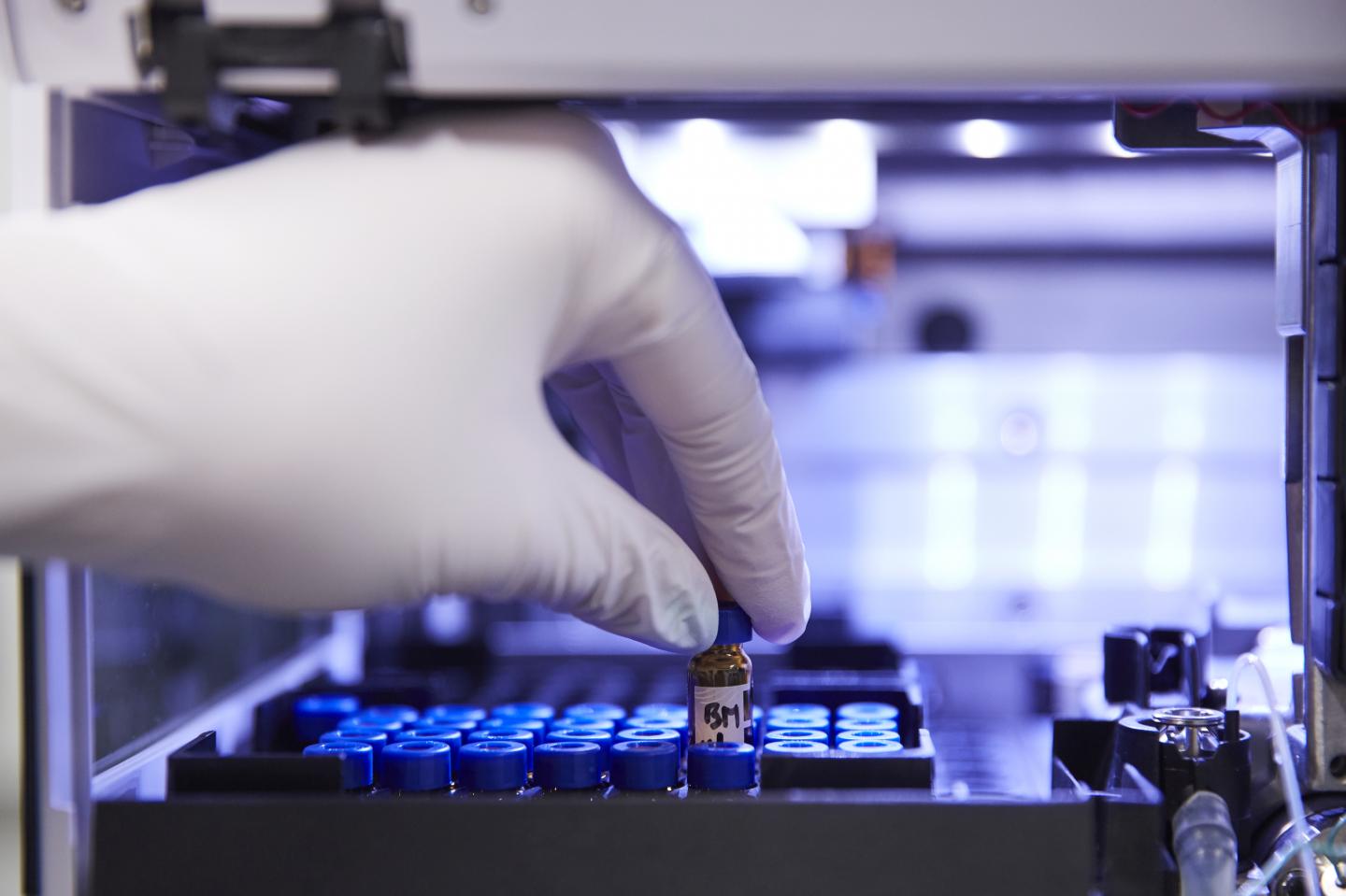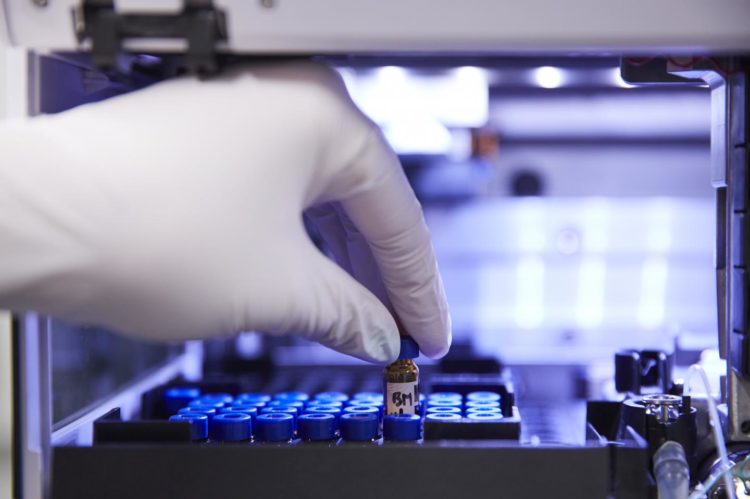Approx. €5.7 million in funding for a new research core

Credit: Sattler/Charité
Research groups from Charité – Universitätsmedizin Berlin and the Max Delbrück Center for Molecular Medicine (MDC) are joining forces with other Berlin-based partners. Pooling their experience and outstanding expertise in the field of mass spectrometry, they will form a new ‘Forschungskern’ or ‘research core’. The aim of the MSTARS consortium is to further develop current technology for clinical application and for the detection and classification of treatment resistance. The Federal Ministry of Education and Research (BMBF) will provide approximately €5.7 million in funding for a minimum of three years.
For many years, comprehensive genetic analysis was considered the method of choice in our attempts to better understand diseases such as cancer and provide patients with increasingly personalized treatment options. It was a successful approach which resulted in a myriad of new, targeted forms of treatment. “However, it was known from an early stage that the course of a disease is not solely determined by our genes,” explains one of the project’s four coequal coordinators, Prof. Dr. Ulrich Keilholz, Director of the Charité Comprehensive Cancer Center (CCCC). “Instead, it is often determined by the extent to which these genes are translated into proteins, how the resulting proteins interact with one another, and how the disease affects our metabolism. Mass spectrometry enables us to identify and quantify biomolecules quickly and comprehensively. We will therefore use this technology to better understand the interplay of disease-relevant cell components and, by doing so, improve precision medicine, i.e. our ability to tailor treatments to the individual patient.”
The MSTARS consortium’s other three coordinators are Prof. Dr. Matthias Selbach, Group Leader of the MDC’s Proteome Dynamics Lab, Prof. Dr. Markus Ralser, Director of Charité’s Institute of Biochemistry, and Prof. Dr. Frederick Klauschen of Charité’s Institute of Pathology. The project’s research partners include numerous other experts from Charité and the MDC, as well as scientists from the Berlin Institute of Health (BIH), Humboldt-Universität zu Berlin and the Max Planck Institute for Molecular Genetics. “By establishing this new research core, we are gathering all Berlin-based expertise in the fields of mass spectrometry, patient care and data analysis, and placing it under one roof,” says Prof. Selbach. “Combining the skills and experience of the various institutions and disciplines with Charité’s extensive clinical expertise will enable us to further develop mass spectrometry-based technologies and apply them in clinical practice.”
“A major aim in this regard is to make mass spectrometry-based methods even more robust and reproducible,” reflects Prof. Ralser and adds: “In order for this technology to improve patient care, we also need to be able to analyze large numbers of samples within a short time. To achieve this, we will build capacity and develop standardized procedures for all processes, from sampling through to data management.”
The infrastructure which the consortium is planning to develop will be suitable for carrying out analyses on a vast array of disorders. The consortium’s research groups will start by studying treatment resistance in patients with squamous cell carcinoma of the head and neck. “The modern treatment strategies available for these patients mainly target specific genetically-determined dysfunctions present in an individual patient’s cancerous tissue,” explains Prof. Klauschen. “For reasons which remain unexplained, these treatments will work very well in some patients but show no effect in other people with the same genetic makeup. We want to study patients’ tissue samples using mass spectrometry to distinguish these groups of patients and make it easier to decide whether or not a particular treatment should be used in a specific patient.” Doing so will require the analysis of vast quantities of data. Therefore, the researchers will also be using artificial intelligence-based approaches.
The MSTARS (Multimodal Clinical Mass Spectrometry to Target Treatment Resistance) project is being funded under a special BMBF funding program, which focuses on establishing research cores dedicated to mass spectrometry in systems medicine (‘Forschungskerne für Massenspektrometrie in der Systemmedizin’). MSTARS is one of a total of four such BMBF-funded consortia. Other research cores will be developed in Heidelberg, Mainz and Munich. Funding has been awarded for an initial period of three years. An interim review after two and a half years will determine whether project funding is to be extended for a further three years. The projects will be launched on 1 March 2020.
###
Mass spectrometry
Mass spectrometry is an analytical technique used to measure the mass of molecules and atoms. The substance to be analyzed is first converted into gas-phase molecules which are subsequently converted into ions. Once accelerated to high velocity by an electrical field, these ions are then sorted by the mass spectrometer system’s analyzer and separated according to their mass/charge ratios. The resulting mass spectrum provides information on a substance’s molecular composition. Mass spectrometry is suitable for the identification, characterization and quantification of a myriad of biomolecules such as proteins, metabolites, sugars and fats, all of which behave differently depending on the precise clinical picture which manifests in a particular patient.
Charité – Universitätsmedizin Berlin
Charité – Universitätsmedizin Berlin is one of the largest university hospitals in Europe, boasting approximately 100 departments and institutes spread across 4 separate campuses. The hospital offers a total of 3,001 beds and, in 2018, treated 152,693 in- and day case patients, in addition to 692,920 outpatients. At Charité, the areas of research, teaching and medical care are closely interlinked. With approximately 18,000 members of staff employed across its group of companies, Charité is one of the largest employers in Berlin. More than 4,500 of its employees work in the field of nursing, and around 4,300 in research and medical care. In 2018, Charité recorded a turnover of more than €1.8 billion, and set a new record by securing more than €170.9 million in external funding. Charité’s Medical Faculty is one of the largest in Germany, educating and training more than 7,500 medical and dentistry students. Charité also offers 619 training positions across 9 different health care professions. http://www.
The Max Delbrück Center for Molecular Medicine (MDC)
The Max Delbrück Center for Molecular Medicine in the Helmholtz Association (MDC) was founded in Berlin in 1992. It is named for the German-American physicist Max Delbrück, who was awarded the 1969 Nobel Prize in Physiology and Medicine. The MDC’s mission is to study molecular mechanisms in order to understand the origins of disease and thus be able to diagnose, prevent and fight it better and more effectively. In these efforts the MDC cooperates with the Charité – Universitätsmedizin Berlin and the Berlin Institute of Health (BIH) as well as with national partners such as the German Center for Cardiovascular Research and numerous international research institutions. More than 1,600 staff and guests from nearly 60 countries work at the MDC, just under 1,300 of them in scientific research. The MDC is funded by the German Federal Ministry of Education and Research (90 percent) and the State of Berlin (10 percent), and is a member of the Helmholtz Association of German Research Centers. http://www.
Media Contact
Gina Dörpholz
[email protected]
49-304-505-64619
Original Source
https:/





